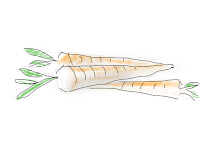Everyone has a relationship with food. Whether it's just for survival, comfort, psychological well-being, socialising, fuelling, competition, or whatever.
I'm not sure if I had any thoughts of what I ate when I was younger, only that it needed to taste good. Chapati, an Indian, pita-like, bread, with stew, preferably either chicken or beef was high on the list of good things. Ugali, a Kenyan dish made of cornmeal was very low. However, facing extreme hunger I would eat ugali.
Unlike people who literally have to beg for food, eat what's given to them, I had a choice of what to eat, ever since I was a child. I had no wants. I had no needs. If I didn't like something, I could find something else that I liked. I had the choice to avoid any food that I did not like to eat. And so during my university years, my selection of foods focussed singularly on only those things that I wanted. And none of the foods I chose had anything to do with a healthy lifestyle.
Why am I eating?
Fuel for my brain. It has to keep ticking and doing the things that it needs to do to keep me gainfully employed. After all, my employment, hence my income, depend on me being able to use my brain. So my brain needs food.How much food to keep the brain going? According to my premier source of information, Google, the brain needs oxygen and sugar. But the health of the neurotransmitters is also critical, and they're made of amino acids, proteins. At a minimum, I have to keep breathing and consuming glucose as well as the occasional protein, to help refresh the neurotransmitters.That doesn't seem like an awful lot. Except that the sugar should come from a good clean source, so that there's not a lot of work to make it into the acceptable glucose that my brain needs. And just enough, we don't want to repackage it as fat and store it up. The protein could come from fish.
What about the body?
For me, this is truly a matter of fuel. Energy to do things like run and walk about. Should be for most people. What about when I'm invited out for lunch, or dinner? Should I refuse to eat, just because someone has handed me some food? Not really, since that's rude. You should eat, but then that eating is planned around the other stuff you've eaten that day, plus the other stuff you propose on eating later. It's easy to choose what to eat, even when I'm invited, so it should not be too difficult to continue my brain feeding/body fuelling attitude.
Balance
 I tend to think that it's not as easy as eating 2000 calories a day. The debate on that number specifically is well documented online. Just do a Google search for "why are we asked to eat 2000 calories daily?" and you'll see some interesting stuff.
I tend to think that it's not as easy as eating 2000 calories a day. The debate on that number specifically is well documented online. Just do a Google search for "why are we asked to eat 2000 calories daily?" and you'll see some interesting stuff.Food is essentially fuel, but in today's society, it's more than just fuel. It means more and it's used for more. Both the way our food is now made, and the way we use it have become dangerous to our health. And in the end, after all, it is about our health, isn't it?







